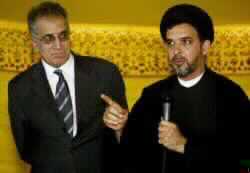The United States assembled Iraqi factions on Tuesday at Ur and told them it has "absolutely no interest" in ruling Iraq. The session ended with an agreement by show of hands to meet again in 10 days to discuss forming an interim authority. The 80 participants also agreed to a list of 13 points, starting with the principle that Iraq must be democratic and also calling for Saddam Hussein's Baath party to be dissolved.
Retired Lt. Gen. Jay Garner, who will head the U.S.-led interim administration in Iraq, opened the conference.
White House envoy Zalmay Khalilzad told delegates that the United States has "no interest, absolutely no interest, in ruling Iraq." "We want you to establish your own democratic system based on Iraqi traditions and values," Khalilzad said.
Participants included Kurds, Sunnis and Shiites from inside the country and others who spent years in exile. U.S. officials invited the groups, which picked their own representatives.
But many Iraqis boycotted the meeting in opposition to U.S. plans to install Garner atop an interim administration.
"Iraq needs an Iraqi interim government," said Abdul Aziz Hakim, a leader of the largest Iraqi Shiite group, the Supreme Council for Islamic Revolution in Iraq. "Anything other than this tramples (on) the rights of the Iraqi people and will be a return to the era of colonization."
U.S. officials stressed that Tuesday's meeting was just the first of many such meetings in Iraq. They hope other Iraqis will join the process.
Once selected, the interim administration could begin handing power to Iraqi officials within three to six months, but forming a government will take longer, officials said, according to AP.
The delegates also discussed the contentious issue of religion's role in society. Sheikh Ayad Jamal Al Din, a Shiite religious leader from Nasiriyah, urged the delegates to craft a secular government. But Nassar Hussein Musawi, a schoolteacher, disagreed: "Those who would like to separate religion from the state are simply dreaming," he said.
PHOTO CAPTION
Zalmay Khalilzad, the White House special envoy to Iraq (L), listens to a local Shiite sheikh from Nassiriya, at the opening of the U.S.-sponsored meeting on post-war Iraq, April 15, 2003 at the Tallil Air Base in the southern desert of Iraq. REUTERS/Tim Sloan/POOL
- Author:
& News Agencies - Section:
WORLD HEADLINES


 Home
Home Discover Islam
Discover Islam Quran Recitations
Quran Recitations Lectures
Lectures
 Fatwa
Fatwa Articles
Articles Fiqh
Fiqh E-Books
E-Books Boys & Girls
Boys & Girls  Women
Women










